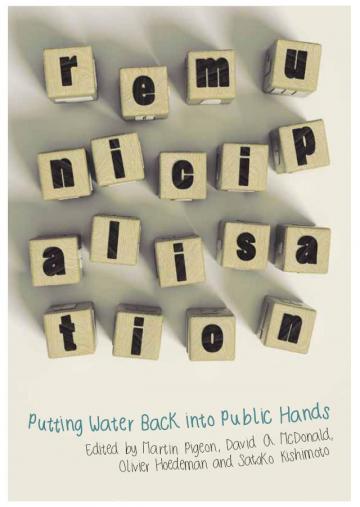
The research of the Corporate Europe Observatory – CEO, the Transnational Institute (TNI) and the Municipal Services Project , presents in a systematic way the trend that runs worldwide for the return of water networks and sanitation networks back into the Public Sector.
Cities worldwide are experiencing the failures of water privatisation. Unequal access, broken promises, environmental hazards and scandalous profit margins are prompting municipalities to take back control of this essential service. Water `remunicipalisation’ is a new, exciting trend that this book explores at length. Case studies analyse the transition from private to public water provision in Paris, Dar es Salaam, Buenos Aires and Hamilton, as well as look at a national level experiment in Malaysia. The journey toward better public water illustrates the benefits and challenges of municipal ownership, while at the same time underlining the stranglehold of international financial institutions and the legacies of corporate control. The cases should be a source of hope and inspiration, but also of specific insights and lessons for anyone wanting to challenge and overturn water privatisation.
On November 24, 2008, the City Council of Paris, France, decided not to renew the municipal water supply service contract with Veolia and Suez, two French companies that dominate the global water market for municipal water services. They had been operating the French capital’s water supply system jointly since 1985, and Veolia had been in charge of billing for the entire system since 1860. The decision came out of an electoral promise made by the left-wing mayor, triggered by rising prices, poor accountability and political ulterior motives. The production and supply, that had been outsourced to separate entities, were unified in a new public company, Eau de Paris, which began running the whole system from January 1st 2010 onwards. The transition was managed on time and with very impressive results on many fronts from increased transparency and financial outcomes (almost 15% savings the first year, water tariffs were lowered by 8% the following year) to improved water resource protection. The integration of the fragmented parts of the drinking system gave birth to a more efficient, consistent and longer-term planning organization, as well as renewed activity of the company into water resource protection, research, innovation, and awareness-raising. The savings reflect the fact that the two private firms, Suez and Veolia, had extracted excessive profits from their private concessions. The new public operator ended the financial opacity and poor accountability that had characterised privatisation, and has demonstrated that remunicipalisation is not just about transferring ownership and management control, but also about embracing progressive water policies, improving environmental standards, enhancing international solidarity and other public interest goals.
Dar es Salaam’s water and sewerage systems were in a terrible state when the government of Tanzania privatised them in 2003, signing a contract with City Water Services (CWS) – a joint-venture of Biwater (UK) and Gauff (Germany). This private consortium was later joined by a Tanzanian private firm, Superdoll. But private management did nothing to improve the situation, with the World Bank describing the private operator’s performance as worse than its predecessor’s. In 2005, a new public operator took over: Dar es Salaam Water and Sewerage Corporation (DAWASCO). Since that time DAWASO has managed to extend coverage and improve critical aspects of water service delivery in Dar es Salaam, proving that public water services can be managed well by the state, and can outperform the private sector in many ways.
The remunicipalisation in the Argentine capital started when the government terminated Suez’s 30-year concession only halfway through that period. This was a tough decision to take given the legal consequences: the Argentine state was immediately sued by the company with a claim of US$1.7 billion at the World Bank’s International Centre for Settlement of Investment Disputes (ICSID), whose decision is still pending at the time of writing. The decision to end the contract came after Suez systematically failed to meet its contractual targets for expanding coverage and improving the quality of water services. The water multinational was not making the promised investments, but repeatedly called for contract renegotiations to boost profits. The new public company, owned 10% by the workers’ union, has achieved impressive results in the first five years, particularly in terms of expanding coverage to citizens in poorer neighbourhoods, involving them in public works programmes and broadening access to water and sanitation.
In 2004, a decade-long fight against water privatization ended in a major victory for the citizens of Hamilton in Canada. In September of that year, the city council voted to take back the operation and maintenance of the city’s water and wastewater treatment plants, ending an era of secrecy, spilled sewage, malfunctioning equipment and a revolving door of corporate contractors. This was all the more a remarkable achievement that the city council wanted to keep the system outsourced to the private sector, but a clearer risks allocation in the tender made the deal economically unappealing to the private companies and no one could qualify. The following years saw a spectacular improvement in the systems’ technical and environmental performance, the city staff being able to outperform the targets initially set for the future private company in charge. The city is now better equipped to deal with the challenges it has to face in the water sector, even though those are serious.
The water sector reform in Malaysia was slightly different from the other cases in this book in the sense that it occurred on a national scale. It is an attempt to harmonise water management throughout the country , partly in response to a series of failures on the part of private water companies in the country, to boost water infrastructure development in the poorest states, and to apply revised performance indicators and standards. In 2005-2006, the Federal Parliament of Malaysia amended the Constitution and voted in two laws enabling a sweeping reform of the water sector. This reform allowed the federal government to seize all assets previously owned by local water operators, public and private alike, and to fast-track asset development with government funding. Operators would later be offered short lease contracts to manage the revitalised assets, but the objective has been to bring the country’s water system under tighter public control and oversight.
The authors of the book, complete their findings with particular reference to Greece, Thessaloniki and the “136 Movement”. Describing first the context of the crisis, they indicate that the deep economic crisis that has developed since the collapse of financial markets in 2008 creates a new and entirely unjustifiable push for privatization. This is particularly the case in Europe, where the crisis is intensifying because of austerity policies imposed in many countries, with European Union (EU) institutions driving these changes. Harsh budget cuts and privatisations are presented as necessary for growth opportunities and to regain the trust of financial markets, even though this deepens the recession in the real economy. Among the most alarming examples of this ideologically-driven and irresponsible privatisation push is Greece, where the administrative takeover by the EU and the International Monetary Fund (IMF) in return for new loans is now imposing the privatisation of water utilities in large cities such as Athens and Thessalonica. Encouragingly, the sell-off of large parts of the shares of these companies to private interests is opposed by citizen groups, who are developing creative counter-strategies.
And the book concludes by stating that, in the Greek city of Thessalonica, a coalition of citizens’ groups called Initiative 136 is creating a new organisation to compete with Suez in the tender for the acquisition of the shares and the management of Thessalonica’s Water and Sewerage Company. The dual goal is to prevent privatisation and replace the model of state administration that has failed to protect the public character of water resources and infrastructure, and secure genuine democratic control of the city’s water by its citizens. The management would be organised through local cooperatives, with citizen participation. Initiative 136 is an effort to pre-empt privatisation before it is implemented, with an attractive concrete alternative in the form of improved public management. It is a truly inspiring reflection of the growing strength and awareness of the water justice networks to see a water remunicipalisation campaign emerge even before privatisation is implemented.
Here you can read the research
1 Comment
Pingbacks
-
[…] subtitled in Greek by SAVEGREEKWATER team. You can read more info on the research and its results here. Once more, as it seems, the “solutions” forced in our country, are already obsolete […]




